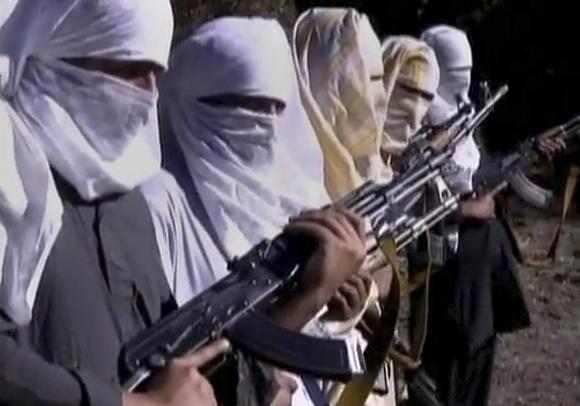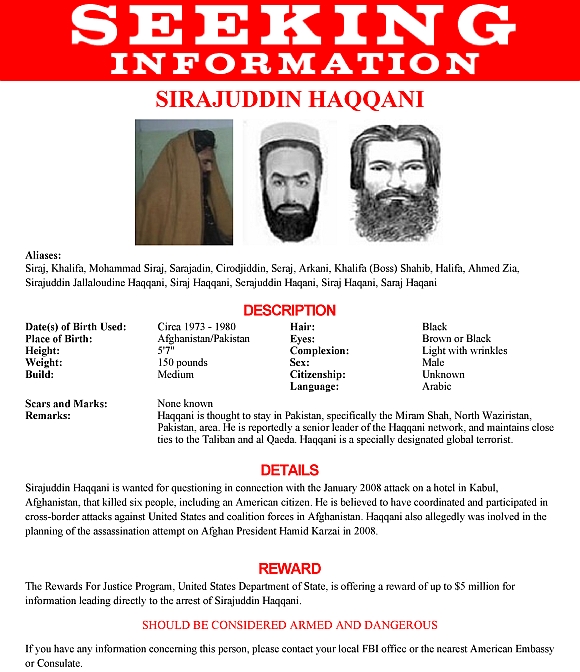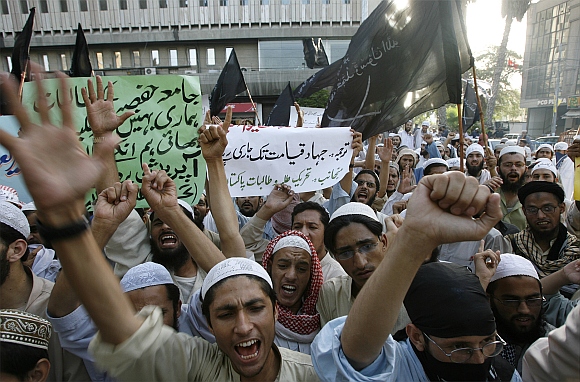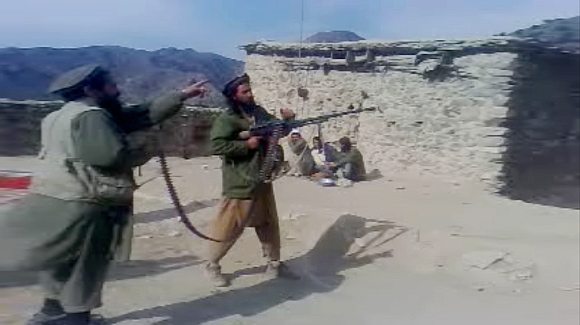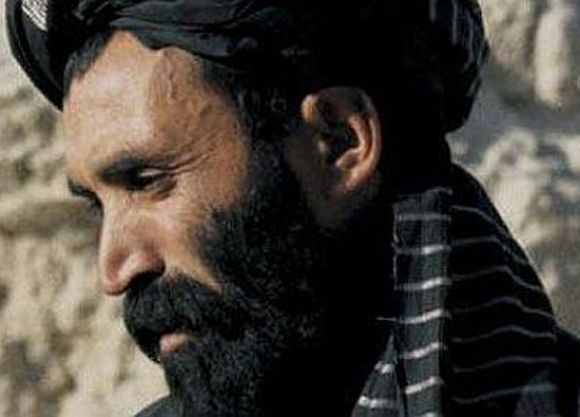 | « Back to article | Print this article |
Haqqani network and ISI working hand in glove
That al-Qaeda-linked Haqqani militant network and Pakistan's military and intelligence establishment are working in tandem with each other has been established with a recent statement by Sirajuddin Haqqani, the operational commander of the Haqqanis, says Amir Mir
Sirajuddin has conceded for the first time the existence of a peace agreement with Pakistan's security establishment according to which the Tehrik-e-Taliban, Afghan Taliban, Haqqani network and several other militant groups won't attack the Pakistani troops and instead focus attention on the United States-led Allied Forces stationed in Afghanistan.
The revelation came in the form of a February 12, 2012 statement issued by Sirajuddin, whose militant network allegedly operates from North Waziristan and has an anti-US agenda.
The US accuses the Haqqani network of using the Pakistani soil to attack the US-led Allied Forces in Afghanistan and that too with the alleged backing of the Pakistani security establishment.
In his statement, Sirajuddin directed the Pakistani Taliban to stop attacking Pakistani security forces in accordance with a peace agreement, thus giving credence to media speculations that the Taliban-linked militants and the military establishment have struck a clandestine ceasefire, especially after Islamabad's decision to suspend the North Atlantic Treaty Organisation supplies going to Afghanistan [in the wake of the November 26, 2011 Salala air strike which killed 25 Pakistani soldiers].
Click NEXT to read further...
The council was formed to resolve differences between the two Talibans
According to well-informed sources in jehadi circles, Sirajuddin issued these directives under the aegis of Shura-e-Murakeba (observation council), an alliance of five Pakistani and Afghan militant groups consisting of the Tehrik-e-Taliban Pakistan led by Commander Hakeemullah Mehsud; Afghan Taliban led by Mullah Mohammad Omar, the Haqqani network led by Sirajuddin and the militant groups of Hafiz Gul Bahadar and Mullah Nazir.
The observation council was launched on January 2, 2012 after lengthy talks between various jehadi groups operating in eastern Afghanistan and the tribal areas of Pakistan bordering Afghanistan.
According to militant circles in Pakistan, the moving spirit behind the formation of the council was Mullah Mohammad Omar, the ameer of Islamic Emirate of Afghanistan (the shadow Taliban government) with a view to resolve differences among various factions of the Pakistani and Afghan Taliban, and garner support for the ongoing battle against the US-led forces in Afghanistan.
Omar was worried by the increasing number of Pakistani Taliban diverting their attention from Afghanistan to Pakistan and making it difficult for the Afghan Taliban to continue their resistance against the powerful NATO and International Security Assistance Force forces. He wanted the Pakistani Taliban groups to focus on Afghanistan, where their fight against the foreign forces was in a decisive phase.
The formation of Shura-e-Murakeba has taken place at a time when the US-led forces in Afghanistan have already begun to execute a significant withdrawal of forces from the war-torn country while seeking peace with the Taliban.
Click NEXT to read further...
'Some elements are trying to destabilise North Waziristan'
Besides making a pledge to stop their fight against their own armed forces and instead focus their attention against the US-led forces in Afghanistan, the components of Shura-e-Murakeba had reportedly also agreed to end suicide attacks, kidnappings for ransom and killing of innocent people, particularly in the militancy-hit tribal areas of Pakistan.
Therefore, Sirajuddin issued the February 12 statement under instructions from Mullah Omar. In his statement, which was distributed in the North Waziristan Agency in the form of a pamphlet, Sirajuddin warned that some elements are trying to destabilise North Waziristan by firing rockets and exploding remote-controlled bombs and other such improvised explosive devices.
"Through a well-organised conspiracy, the peaceful law and order situation is being aggravated in North Waziristan. Through this pamphlet, all the Mujahideen (militants); i.e., Ansaar (those being provided shelter) and Mohajireen (the refugees) are informed that we had signed a peace agreement with Pakistan in North Waziristan and it is compulsory for every one of us to follow that truce," said the one-page Urdu language statement issued on the letterhead of the Observation Council.
"Nobody would be allowed to violate the accord and if someone is found violating it, he will be treated as a culprit and stern action would be taken against him", it said.
All these developments belie repeated denials by the Pakistani military spokesman who had strongly refuted media reports that the security establishment was holding peace talks with the Tehrik-e-Taliban Pakistan or its affiliated militant groups.
Click NEXT to read further...
The Haqqani network has been blamed for most attacks on foreign forces
"Such reports are concocted, baseless and unfounded," a recent statement issued by the Inter Services Public Relations spokesman had claimed in November 2011 while refuting reports of peace negotiations between the Pakistani military and the militants.
"Any contemplated negotiation/reconciliation process with any of the militant groups has to be done by the government", the spokesman had added.
As a matter of fact, the US military leadership has repeatedly blamed the Haqqani network for most of the terrorist attacks on international forces stationed in Afghanistan, and on September 29, 2011, the US Treasury Department imposed sanctions on Sirajuddin and several other group leaders on in the wake of the September 13, 2011 attack in Kabul.
"These financiers and facilitators provide the fuel for Afghan Taliban, Haqqani Network and al-Qaeda to realise their violent aspirations", David Cohen, the under secretary of the US Treasury for Terrorism and Financial Intelligence, said in a statement.
The lethal Haqqani Network broadly consists of four groups: those who had served under Jalaluddin Haqqani during the Russian occupation of Afghanistan; those from Loya Paktiya who joined the Haqqani movement since 2001 in the aftermath of the 9/11 attacks and the subsequent invasion of Afghanistan; those from North Waziristan in the Federally Administered Tribal Area of Pakistan, who have been associated with Haqqanis over the years; and non-Pashtun foreign militants, including Arabs, Chechens, and Uzbeks.
Click NEXT to read further...
'Mullah Omar is our leader and we totally obey him'
The Haqqani network's central leadership which deals with Afghanistan wrests in the family -- as Sirajuddin masterminds terror attacks, his first cousin Mullah Sangeen Zadran coordinates attacks with Badaruddin, another Haqqani scion.
In 2009, Washington announced $5 million head-money on Sirajuddin and later announced reward for his two other brothers -- Naseeruddin -- and Badruddin. The group's principal fundraiser is Nasiruddin, who's the son of Jalaluddin through an Arab wife. Nasiruddin can speak Arabic and has acted as a liaison with several important al-Qaeda figures.
But contrary to Sirajuddin's recent claim that his network has already shifted its base to Afghanistan, Western intelligence agencies have maintained that the network still operates from three compounds in North Waziristan.
The first one in located in the Miram Shah bazaar in a religious seminary; the second camp is in the neighborhood of Sarai Darpa Khel while the third compound is located in the suburb of Danday Darpa Khel, where most of the Haqqani Network leaders live.
Sirajuddin oversees the political and military activities of the Miram Shah Shura besides serving as the main liaison to the infamous Quetta Shura Taliban, the leadership body of the Taliban, led by Mullah Omar as well as to the leadership of the Pakistani Taliban.
After being branded by the Americans as a "veritable arm" of ISI, Sirajuddin denied [in his October 3, 2011 interview with BBC] any links with the Pakistani agency and pledged loyalty to Mullah Omar, saying "he is our leader and we totally obey him."
